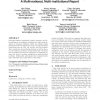724 search results - page 72 / 145 » Virtual Experiment Environments Design for Science Education |
ACMACE
2007
ACM
14 years 22 days ago
2007
ACM
Recently a new generation of virtual worlds has emerged in which users are provided with open-ended modelling tools with which they can create and modify world content. The result...
SIGCSE
2004
ACM
14 years 2 months ago
2004
ACM
Ê Among the many ways to focus CS1/CS2 content, two have been published that emphasize concepts of component-based software engineering. Courses based on these two instances of a ...
BCSHCI
2008
13 years 10 months ago
2008
In this paper, we describe the design and evaluation of SMART, an educational system that uses augmented reality for teaching 2nd grade-level concepts, adequate and integrated wit...
CHI
1998
ACM
14 years 29 days ago
1998
ACM
A great deal of effort has gone into developing open-ended inquiry activities for science education as well as complex computer tools for accessing scientific data to help student...
ICSE
2005
IEEE-ACM
14 years 8 months ago
2005
IEEE-ACM
Successful software engineering requires experience and acknowledgment of complexity, including that which leads designers to recognize ambiguity within the software design descri...

